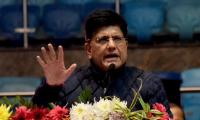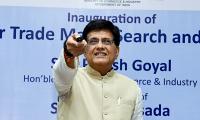PLI Scheme: Kickstart for Competition, Says Goyal
Commerce Minister Piyush Goyal emphasizes the Production-Linked Incentive (PLI) scheme as an initial boost for Indian industries, highlighting the importance of future competition for growth. The scheme aims to attract investments, enhance manufacturing, and make Indian companies globally...

Illustration: Dominic Xavier/Rediff.com
New Delhi, Feb 3 (PTI) The industry should look at the measures under the Production-Linked Incentive (PLI) scheme as an initial support because going forward, the industry has to face competition to grow further, Commerce and Industry Minister Piyush Goyal said on Saturday.
He asked the PLI incentive beneficiary firms to share their "constructive criticism and feedback for better implementation of the scheme".
The idea is to make India a manufacturing powerhouse and there is a long journey ahead, he said.
More than 1,200 stakeholders, including government officials and industry players are meeting here and deliberating on the progress of 14 PLI schemes.
The scheme incentives should not be seen as crutches and "we are not looking to make you dependent on government subsidies. This is only like a kickstart The PLI scheme is only meant to give you that little bit of a boost to kickstart your effort and please look at it as a kickstart, an initial support (because) ultimately competition will prevail," Goyal said.
"We will ultimately have to compete with each other and with the world," he added.
The minister also suggested that the industry gradually focus on global markets and come out of the "cosy comfort" of India's large domestic market.
A more outward looking effort would help add scale, volume and enhance cost effectiveness, he said, adding, "We are also looking for your cooperation and collaboration".
Speaking at the meeting, Department for Promotion of Industry and Internal Trade (DPIIT) Secretary Rajesh Kumar Singh called upon the industry to focus on value addition as India's manufacturing Gross Value Added (GVA) is about 17.4 per cent.
It is not enough for a country that is looking to become a developed nation and for huge job creation, Singh said.
He added that certain quarters have raised some problems with regards to the scheme and the government is working to address those issues.
He added that local value addition is happening in sectors such as mobile and white goods.
The other concern people talk about generally is that in such subsidy schemes, industry uses the incentive and leave as they invest for a short time to get the subsidy, but "in this case, the scheme design is such" that it is "highly unlikely" that the industry will leave.
The most important thing is that this government trusts the private sector and it has made this scheme in consultation with the industry.
"The scheme will help you grow bigger. You will be able to change India's manufacturing landscape and really bump up our share in the GVA as (at present) it is really far too low for an economy that is trying to achieve a developed nation status in the next 25 years," Singh said.
He added that there could be some "teething" issues in the scheme with regards to documentation or incentive disbursal, but those are "nuts and bolts" of the story on which "we would like your feedback".
Officials from 10 ministries and departments, project management agencies and industry players from 14 PLI schemes are attending the meeting.
The discussions are likely to set higher standards of achievements of the PLI scheme and facilitate its effective implementation going forward.
The government in 2021 announced PLI schemes for 14 sectors such as telecommunication, white goods, textiles, manufacturing of medical devices, automobiles, speciality steel, food products, high-efficiency solar PV modules, advanced chemistry cell battery, drones, and pharma, with an outlay of Rs 1.97 lakh crore.
The schemes aim to attract investments in key sectors and cutting-edge technology; ensure efficiency, bring economies of size and scale in the manufacturing sector and make Indian companies and manufacturers globally competitive.
The objective is to bring all stakeholders on a common platform, fostering a sense of ownership to facilitate exchange of knowledge and experiences, good practices and success stories, ultimately contributing to the successful implementation of PLI schemes.
The deliberations assume significance as the government has disbursed only Rs 4,415 crore under the schemes for eight sectors, including electronics and pharma, till October this fiscal.
A total of Rs 1,515 crore was disbursed in FY24 till October, while it was Rs 2,900 crore in 2022-23 when payments under the scheme commenced.
Respective ministries, along with Project Monitoring Agencies (PMAs), scrutinise the claim applications.
As of date, 746 applications have been approved in 14 sectors with an expected investment of over Rs 3 lakh crore. About 176 MSMEs are among the PLI beneficiaries in sectors such as pharma, and telecom.
By the end of this fiscal, the disbursal target is Rs 11,000 crore.
Later in the day, while addressing the media, Goyal said that all the 746 applicants of the PLI schemes participated in the deliberations.
He said that the scheme is a successful programme, there may be small problems here and there, which is bound to happen in any program or scheme.
"Lot of suggestions and ideas came in, certainly some concerns also came in but all in all I can assure you that there is no delay in the scheme," he told reporters.
Goyal said that there is a gestation period in the implementation of a project.
"Certain sectors have taken off very fast but those sectors started also first like mobiles and APIs and these are sectors where gestation period is relatively lesser but if suppose you have to make compressors for ACs, its a very complicated technology-based industry," he added.
He asked the PLI incentive beneficiary firms to share their "constructive criticism and feedback for better implementation of the scheme".
The idea is to make India a manufacturing powerhouse and there is a long journey ahead, he said.
More than 1,200 stakeholders, including government officials and industry players are meeting here and deliberating on the progress of 14 PLI schemes.
The scheme incentives should not be seen as crutches and "we are not looking to make you dependent on government subsidies. This is only like a kickstart The PLI scheme is only meant to give you that little bit of a boost to kickstart your effort and please look at it as a kickstart, an initial support (because) ultimately competition will prevail," Goyal said.
"We will ultimately have to compete with each other and with the world," he added.
The minister also suggested that the industry gradually focus on global markets and come out of the "cosy comfort" of India's large domestic market.
A more outward looking effort would help add scale, volume and enhance cost effectiveness, he said, adding, "We are also looking for your cooperation and collaboration".
Speaking at the meeting, Department for Promotion of Industry and Internal Trade (DPIIT) Secretary Rajesh Kumar Singh called upon the industry to focus on value addition as India's manufacturing Gross Value Added (GVA) is about 17.4 per cent.
It is not enough for a country that is looking to become a developed nation and for huge job creation, Singh said.
He added that certain quarters have raised some problems with regards to the scheme and the government is working to address those issues.
He added that local value addition is happening in sectors such as mobile and white goods.
The other concern people talk about generally is that in such subsidy schemes, industry uses the incentive and leave as they invest for a short time to get the subsidy, but "in this case, the scheme design is such" that it is "highly unlikely" that the industry will leave.
The most important thing is that this government trusts the private sector and it has made this scheme in consultation with the industry.
"The scheme will help you grow bigger. You will be able to change India's manufacturing landscape and really bump up our share in the GVA as (at present) it is really far too low for an economy that is trying to achieve a developed nation status in the next 25 years," Singh said.
He added that there could be some "teething" issues in the scheme with regards to documentation or incentive disbursal, but those are "nuts and bolts" of the story on which "we would like your feedback".
Officials from 10 ministries and departments, project management agencies and industry players from 14 PLI schemes are attending the meeting.
The discussions are likely to set higher standards of achievements of the PLI scheme and facilitate its effective implementation going forward.
The government in 2021 announced PLI schemes for 14 sectors such as telecommunication, white goods, textiles, manufacturing of medical devices, automobiles, speciality steel, food products, high-efficiency solar PV modules, advanced chemistry cell battery, drones, and pharma, with an outlay of Rs 1.97 lakh crore.
The schemes aim to attract investments in key sectors and cutting-edge technology; ensure efficiency, bring economies of size and scale in the manufacturing sector and make Indian companies and manufacturers globally competitive.
The objective is to bring all stakeholders on a common platform, fostering a sense of ownership to facilitate exchange of knowledge and experiences, good practices and success stories, ultimately contributing to the successful implementation of PLI schemes.
The deliberations assume significance as the government has disbursed only Rs 4,415 crore under the schemes for eight sectors, including electronics and pharma, till October this fiscal.
A total of Rs 1,515 crore was disbursed in FY24 till October, while it was Rs 2,900 crore in 2022-23 when payments under the scheme commenced.
Respective ministries, along with Project Monitoring Agencies (PMAs), scrutinise the claim applications.
As of date, 746 applications have been approved in 14 sectors with an expected investment of over Rs 3 lakh crore. About 176 MSMEs are among the PLI beneficiaries in sectors such as pharma, and telecom.
By the end of this fiscal, the disbursal target is Rs 11,000 crore.
Later in the day, while addressing the media, Goyal said that all the 746 applicants of the PLI schemes participated in the deliberations.
He said that the scheme is a successful programme, there may be small problems here and there, which is bound to happen in any program or scheme.
"Lot of suggestions and ideas came in, certainly some concerns also came in but all in all I can assure you that there is no delay in the scheme," he told reporters.
Goyal said that there is a gestation period in the implementation of a project.
"Certain sectors have taken off very fast but those sectors started also first like mobiles and APIs and these are sectors where gestation period is relatively lesser but if suppose you have to make compressors for ACs, its a very complicated technology-based industry," he added.
You May Like To Read
TODAY'S MOST TRADED COMPANIES
- Company Name
- Price
- Volume
- Vodafone-Idea-L
- 11.65 (+ 3.56)
- 106772451
- Alstone-Textiles
- 0.28 ( -3.45)
- 44187760
- Mangalam-Industrial
- 0.88 ( -2.22)
- 39177573
- Sunshine-Capital
- 0.27 (+ 3.85)
- 35956340
- GMR-Airports
- 104.40 (+ 6.37)
- 30453005






